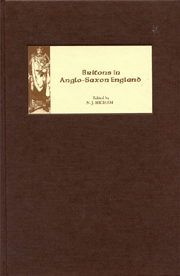Book contents
- Frontmatter
- Contents
- List of Illustrations
- List of Tables
- Contributors
- Dedication
- Acknowledgements
- Abbreviations
- 1 Britons in Anglo-Saxon England: An Introduction
- 2 Anglo-Saxon Attitudes
- 3 Forgetting the Britons in Victorian Anglo-Saxon Archaeology
- 4 Romano-British Metalworking and the Anglo-Saxons
- 5 Invisible Britons, Gallo-Romans and Russians: Perspectives on Culture Change
- 6 Historical Narrative as Cultural Politics: Rome, ‘British-ness’ and ‘English-ness’
- 7 British Wives and Slaves? Possible Romano-British Techniques in ‘Women's Work’
- 8 Early Mercia and the Britons
- 9 Britons in Early Wessex: The Evidence of the Law Code of Ine
- 10 Apartheid and Economics in Anglo-Saxon England
- 11 Welsh Territories and Welsh Identities in Late Anglo-Saxon England
- 12 Some Welshmen in Domesday Book and Beyond: Aspects of Anglo-Welsh Relations in the Eleventh Century
- 13 What Britons Spoke around 400 AD
- 14 Invisible Britons: The View from Linguistics
- 15 Why Don't the English Speak Welsh?
- 16 Place-Names and the Saxon Conquest of Devon and Cornwall
- 17 Mapping Early Medieval Language Change in South-West England
- Index
2 - Anglo-Saxon Attitudes
Published online by Cambridge University Press: 12 September 2012
- Frontmatter
- Contents
- List of Illustrations
- List of Tables
- Contributors
- Dedication
- Acknowledgements
- Abbreviations
- 1 Britons in Anglo-Saxon England: An Introduction
- 2 Anglo-Saxon Attitudes
- 3 Forgetting the Britons in Victorian Anglo-Saxon Archaeology
- 4 Romano-British Metalworking and the Anglo-Saxons
- 5 Invisible Britons, Gallo-Romans and Russians: Perspectives on Culture Change
- 6 Historical Narrative as Cultural Politics: Rome, ‘British-ness’ and ‘English-ness’
- 7 British Wives and Slaves? Possible Romano-British Techniques in ‘Women's Work’
- 8 Early Mercia and the Britons
- 9 Britons in Early Wessex: The Evidence of the Law Code of Ine
- 10 Apartheid and Economics in Anglo-Saxon England
- 11 Welsh Territories and Welsh Identities in Late Anglo-Saxon England
- 12 Some Welshmen in Domesday Book and Beyond: Aspects of Anglo-Welsh Relations in the Eleventh Century
- 13 What Britons Spoke around 400 AD
- 14 Invisible Britons: The View from Linguistics
- 15 Why Don't the English Speak Welsh?
- 16 Place-Names and the Saxon Conquest of Devon and Cornwall
- 17 Mapping Early Medieval Language Change in South-West England
- Index
Summary
I TAKE my title from the novel of that name by Angus Wilson, who borrowed it from Lewis Carroll. Debby Banham has also already used the title for an interesting paper which addresses a different, although related, topic from mine. At the time of the conference I was, like most of us, excited by the find of a rich seventh-century burial at Prittlewell near Southend, excavated by the Museum of London archaeology service during the autumn of 2003. Discussion of this find reflects current thinking about the relationship between religious belief and burial practice, specifically early medieval Christianity and paganism, which can be set against sixty years of evolving interpretations of the significance of Sutton Hoo, a site whose discovery influenced Angus Wilson's choice of theme for his novel. While writing this paper up for publication, I was struck by the contrast between two television programmes screened in 2004 within a few weeks of each other, both on Channel 4, both purporting to present current knowledge of the Anglo-Saxon impact on Britain but presenting very different stories. The reasons for that difference seem to me to encapsulate the main theme of this paper, which revisits issues I have already discussed elsewhere.
My contention is that our attitudes, whether Anglo-Saxon or not, arise from our multiple and changing individual and collective identities, which condition the ways in which we see and interpret the world, past or present.
- Type
- Chapter
- Information
- Britons in Anglo-Saxon England , pp. 16 - 26Publisher: Boydell & BrewerPrint publication year: 2007



